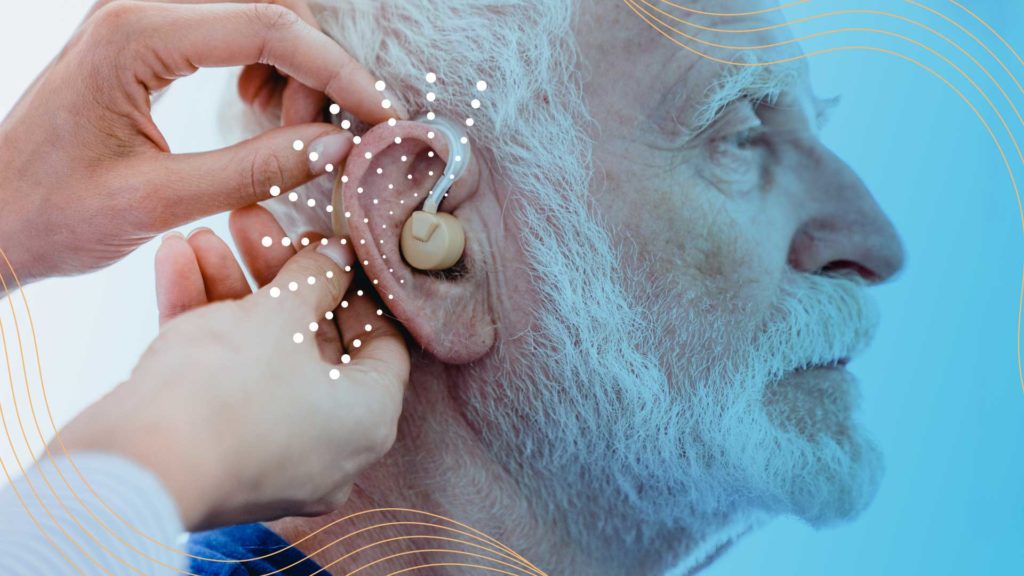
Some of the links on this page may link to our affiliates. Learn more about our ad policies.
What Causes Tinnitus?

Have you ever experienced a persistent ringing noise in your ears? If so, you aren’t alone. That ringing sound is called tinnitus and the Centers for Disease Control and Prevention (CDC) estimates that nearly 50 million Americans experience some form of it.
By The Numbers
The CDC estimates that nearly 20 million people have chronic tinnitus and at least two million have extreme or debilitating cases.
Did You Know?
Tinnitus comes from the Latin word ‘tinnire’ which means ‘to ring.’
Who is at Risk?
Experts say men are more likely than women to develop tinnitus. They also add tinnitus is more prevalent in Caucasians than other racial or ethnic groups.
Find What You Need
What is Tinnitus and What Causes It?
Tinnitus occurs when you hear a sound in one or both of your ears that no one else can hear because it’s not being caused by an external sound. Unfortunately, there is no clear answer to what causes tinnitus. Researchers theorize that something happens in the part of the brain that processes sound and the abnormal activity may lead to tinnitus. The brain creates the illusion of sound, but how or why that happens is still a mystery.
Some experts believe tinnitus is the result of the brain trying to adjust to losing sensory hair cells, so it turns up your sensitivity to sound. Others think damage in the inner ear throws things out of balance and causes problems in the part of your brain that processes sound.
Tinnitus is most common in older adults and often comes with noise- or age-related hearing loss. Sometimes, doctors can pinpoint a specific reason tinnitus has started. Certain cancer drugs, nonsteroidal anti-inflammatory drugs and even some anti-depressants can result in tinnitus. A head injury, Temporomandibular joint disorder (TMJ) and even stress can trigger tinnitus.
Am I At Risk for Tinnitus?
Anyone can develop tinnitus, but there are some factors that put you at a higher risk including age, recreational activities and workplace environments.

Age
As we age, our risk of developing tinnitus goes up, peaking between the ages of 60 and 69. Experts believe it’s due mainly to age-related hearing loss that occurs naturally as we get older.

U.S. Service Members and Veterans
As you might expect, members of the military are consistently exposed to loud noises either during combat, regular training exercises or special operations. The result is often hearing loss and/or tinnitus. In fact, tinnitus is one of the biggest reasons for service-related disability in U.S. veterans.

Workplace Environments
As you might expect, members of the military are consistently exposed to loud noises either during combat, regular training exercises or special operations. The result is often hearing loss and/or tinnitus. In fact, tinnitus is one of the biggest reasons for service-related disability in U.S. veterans.

Hunters and Motorsports Enthusiasts
Those who spend a lot of time participating in any type of racing can develop tinnitus from the consistently loud engine noises. Avid hunters who spend a lot of time taking target practice can hurt their hearing from the loud noises produced by firearms.
What are the Types of Tinnitus?
There are actually two different types of tinnitus. One is called subjective tinnitus, and the other is objective tinnitus.
Subjective Tinnitus
Nearly all of tinnitus cases are considered subjective. Subjective tinnitus is when you hear a noise that no one else can hear. The condition varies from person to person and can appear and disappear suddenly. The noise can be anything from a low rumble to a high squeal and can be heard in either one or both of your ears. Some people can hear the noise all the time, and it may come and go for others. The condition can last between three and 12 months at a time or be a chronic condition that doesn’t stop.
Objective or Pulsatile Tinnitus
Objective tinnitus is rare. It can also be referred to as pulsatile tinnitus and it only accounts for about one percent of the tinnitus cases in the U.S. It’s when you hear noises in your ears that your doctor can also hear during the examination. The noises happen in the middle ear and are usually causes by blood vessels.
What are the Symptoms of Tinnitus?
Tinnitus has to be diagnosed by a medical professional, but testing usually begins with someone going to a doctor for a noise in their ears that only they can hear and it won’t go away. Much of the time it’s described as ringing in the ears. But there are other phantom noises you may hear:
- Buzzing
- Chirping
- Clicking
- Hissing
- Humming
- Roaring
Sometimes you may hear a combination of these sounds occurring at different times. If you experience any of these for any length of time, it’s best to make an appointment to see your doctor and get it checked out. When you do see your doctor be sure to be as specific as possible about the type of noise you hear, because details can give clues to a larger problem.
If it’s clicking you hear, that could indicate the muscles around your ears are contracting. Pulsing, rushing or humming could indicate high blood pressure or blood flow problems. Low-pitched ringing may indicate a blockage in your ear canal or Meniere’s Disease.
How is Tinnitus Diagnosed?
Your doctor will ask you several questions and do a thorough examination to determine if you have tinnitus or if there’s some other issue. They’ll start by checking your ears, head and neck and then may administer a hearing test to see how well you can hear a range of tones.
Sometimes, the way we move can give medical clues. Your doctor may ask you to move your eyes, neck, arms or legs or even clench your jaw. They’ll ask if your tinnitus is better or worse when you do those things. The results may indicate an underlying problem that needs to be addressed or treated.
Depending on your symptoms and the severity of them, your doctor may order an MRI to see if anything else can be learned about what’s causing your particular symptoms. A doctor may also order lab tests to get a blood sample and check for anemia, heart disease, thyroid issues or a vitamin deficiency.
How is Tinnitus Treated?
Unfortunately, there is no cure for tinnitus, but it can be treated or managed. If it’s being caused by an underlying condition, your doctor may be able to adjust or prescribe medicine to help. Removing ear wax build-up or getting hearing aids can also help improve your symptoms.
There are of approaches you can take to minimize the disruption of tinnitus.
White Noise Machines
White noise machines can produce a variety of sounds – everything from static to ocean waves. So, it’s easy to pick out a machine that suits your tastes. It’s a good way to mask your tinnitus symptoms and help you fall and stay asleep and keep the tinnitus from interfering with you getting enough rest. Running fans, humidifiers, dehumidifiers or air conditioners are also a good way to produce white noise.
Masking Devices
Masking devices are similar to hearing aids. They are worn in the ears and emit a continuous, low-level white noise that makes the symptoms of tinnitus less noticeable.
Tinnitus Retraining Therapy (TRT)
TRT combines masking the symptoms with professional counseling. The therapy is tailored for your specific needs and is usually done by an audiologist or at a tinnitus treatment center. Often, you will wear a masking device in your ears while receiving counseling. The goal is to help you not to be as aware of tinnitus.
Cognitive Behavioral Therapy (CBT)
In CBT, you will learn coping techniques from a psychologist or a licensed mental health professional. Sometimes, tinnitus can be chronic and interfere with sleep, focus and concentration. The goal with CBT is to help lessen your awareness of tinnitus, as well as any anxiety or depression you have associated with it. This type of therapy can be done one on one, in a group, and even online.
Medications
Currently, there are no drugs on the market to effectively treat tinnitus. But your doctor may prescribe something to help you with any anxiety or depression you may have because of tinnitus.
Magnetic or Electrical Stimulation
Researchers believe tinnitus is really a brain processing issue, so they’re testing whether magnetic or electrical stimulation of the brain can help treat the symptoms in the future.
As with so many other things, tinnitus can be affected by what you eat. Alcohol, caffeine, food with preservatives and salt can all be triggers that make your tinnitus worse. So, you may want to experiment with your diet to see if what you eat causes your symptoms to be better or worse.
Can Tinnitus be Prevented?
If you are worried about developing tinnitus, there are things you can do to help lessen your chances of experiencing it. The best thing to do is wear ear plugs to protect your hearing in situations where you are exposed to consistently loud noises. If you work in a noisy environment, you’ll want to get ear plugs that fit well, are comfortable and can be worn all day to cut down on your chances of developing tinnitus.
The other thing to keep in mind is how often you use your headphones and earbuds, and the volume level you keep them at. Having the volume up too loud over a period of time can eventually affect your hearing and cause problems down the road. So, be aware of your volume level and how often you use this from of technology.

